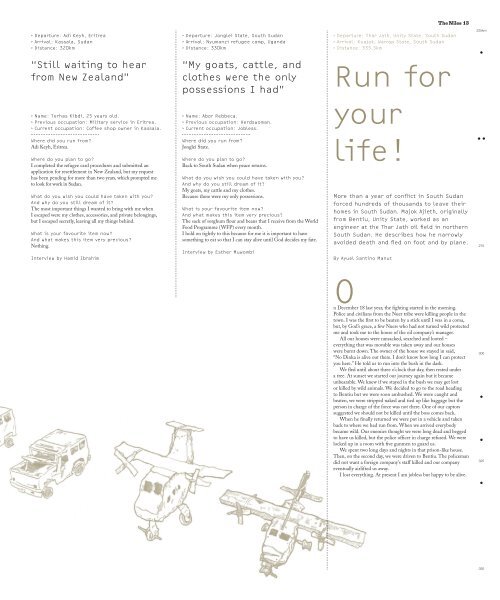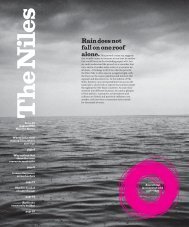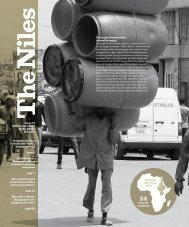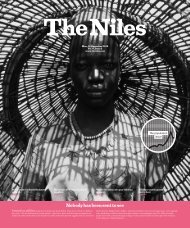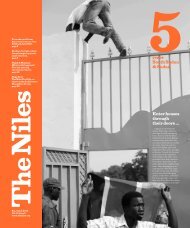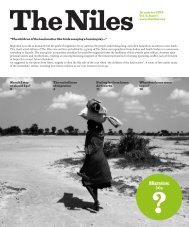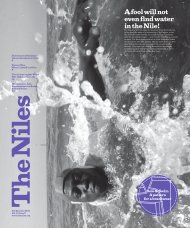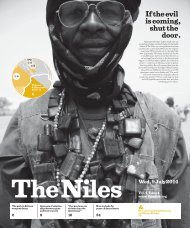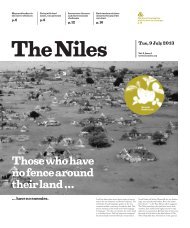Experience is a solid walking stick...
I don’t know where to start. I wish I had taken my wife. Who am I without my school certificates? These three remarks by refugees, scribbled into notebooks by The Niles correspondents, support the Sudanese proverb that ‘experience is a solid walking stick’. War, hunger and poverty have repeatedly forced both Sudanese and South Sudanese to flee their homes. Right now more than 4.5 million people are on the road in the two countries, like these passengers on a bus from Khartoum to Shendi. The fifth edition of The Niles documents their journeys, following their routes to neighbouring villages, fast-expanding cities or the other side of the globe, revealing diverse experiences with a recurring theme: When you leave home, the familiar is lost but the essential remains.
I don’t know where to start. I wish I had taken my wife. Who am I without my school certificates? These three remarks by refugees, scribbled into notebooks by The Niles correspondents, support the Sudanese proverb that ‘experience is a solid walking stick’. War, hunger and poverty have repeatedly forced both Sudanese and South Sudanese to flee their homes. Right now more than 4.5 million people are on the road in the two countries, like these passengers on a bus from Khartoum to Shendi. The fifth edition of The Niles documents their journeys, following their routes to neighbouring villages, fast-expanding cities or the other side of the globe, revealing diverse experiences with a recurring theme: When you leave home, the familiar is lost but the essential remains.
Create successful ePaper yourself
Turn your PDF publications into a flip-book with our unique Google optimized e-Paper software.
The Niles 13<br />
> Departure: Adi Keyh, Eritrea<br />
> Arrival: Kassala, Sudan<br />
> D<strong>is</strong>tance: 320km<br />
> Departure: Jonglei State, South Sudan<br />
> Arrival: Nyumanzi refugee camp, Uganda<br />
> D<strong>is</strong>tance: 330km<br />
> Departure: Thar Jath, Unity State, South Sudan<br />
> Arrival: Kuajok, Warrap State, South Sudan<br />
> D<strong>is</strong>tance: 335.5km<br />
225km<br />
“Still waiting to hear<br />
from New Zealand”<br />
“My goats, cattle, and<br />
clothes were the only<br />
possessions I had”<br />
Run for<br />
> Name: Terhas Kibdi, 25 years old.<br />
> Previous occupation: Military service in Eritrea.<br />
> Current occupation: Coffee shop owner in Kassala.<br />
> Name: Abor Rebbeca.<br />
> Previous occupation: Herdswoman.<br />
> Current occupation: Jobless.<br />
your<br />
Where did you run from?<br />
Adi Keyh, Eritrea.<br />
Where do you plan to go?<br />
I completed the refugee card procedures and submitted an<br />
application for resettlement in New Zealand, but my request<br />
has been pending for more than two years, which prompted me<br />
to look for work in Sudan.<br />
What do you w<strong>is</strong>h you could have taken with you?<br />
And why do you still dream of it?<br />
The most important things I wanted to bring with me when<br />
I escaped were my clothes, accessories, and private belongings,<br />
but I escaped secretly, leaving all my things behind.<br />
What <strong>is</strong> your favourite item now?<br />
And what makes th<strong>is</strong> item very precious?<br />
Nothing.<br />
Interview by Hamid Ibrahim<br />
Where did you run from?<br />
Jonglei State.<br />
Where do you plan to go?<br />
Back to South Sudan when peace returns.<br />
What do you w<strong>is</strong>h you could have taken with you?<br />
And why do you still dream of it?<br />
My goats, my cattle and my clothes.<br />
Because these were my only possessions.<br />
What <strong>is</strong> your favourite item now?<br />
And what makes th<strong>is</strong> item very precious?<br />
The sack of sorghum flour and beans that I receive from the World<br />
Food Programme (WFP) every month.<br />
I hold on tightly to th<strong>is</strong> because for me it <strong>is</strong> important to have<br />
something to eat so that I can stay alive until God decides my fate.<br />
Interview by Esther Muwombi<br />
life!<br />
More than a year of conflict in South Sudan<br />
forced hundreds of thousands to leave their<br />
homes in South Sudan. Majok Ajieth, originally<br />
from Bentiu, Unity State, worked as an<br />
engineer at the Thar Jath oil field in northern<br />
South Sudan. He describes how he narrowly<br />
avoided death and fled on foot and by plane.<br />
By Ayuel Santino Manut<br />
275<br />
On December 18 last year, the fighting started in the morning.<br />
Police and civilians from the Nuer tribe were killing people in the<br />
town. I was the first to be beaten by a <strong>stick</strong> until I was in a coma,<br />
but, by God’s grace, a few Nuers who had not turned wild protected<br />
me and took me to the house of the oil company’s manager.<br />
All our houses were ransacked, searched and looted –<br />
everything that was movable was taken away and our houses<br />
were burnt down. The owner of the house we stayed in said,<br />
“No Dinka <strong>is</strong> alive out there. I don’t know how long I can protect<br />
you here.” He told us to run into the bush in the dark.<br />
We fled until about three o’clock that day, then rested under<br />
a tree. At sunset we started our journey again but it became<br />
unbearable. We knew if we stayed in the bush we may get lost<br />
or killed by wild animals. We decided to go to the road heading<br />
to Bentiu but we were soon ambushed. We were caught and<br />
beaten, we were stripped naked and tied up like baggage but the<br />
person in charge of the force was not there. One of our captors<br />
suggested we should not be killed until the boss comes back.<br />
When he finally returned we were put in a vehicle and taken<br />
back to where we had run from. When we arrived everybody<br />
became wild. Our enemies thought we were long dead and begged<br />
to have us killed, but the police officer in charge refused. We were<br />
locked up in a room with five gunmen to guard us.<br />
We spent two long days and nights in that pr<strong>is</strong>on-like house.<br />
Then, on the second day, we were driven to Bentiu. The policeman<br />
did not want a foreign company’s staff killed and our company<br />
eventually airlifted us away.<br />
I lost everything. At present I am jobless but happy to be alive.<br />
300<br />
325<br />
350<br />
theniles_enar_20150327.indd 13<br />
2015/3/31 1:50 PM


